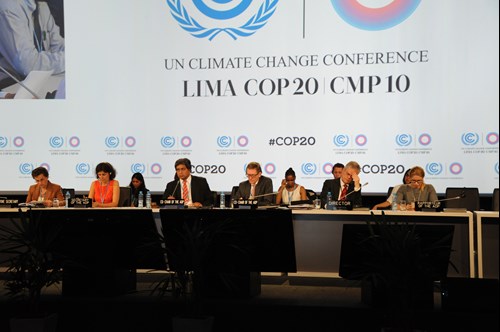Jennifer M. Klein, Esq., Associate Director & Fellow Meredith Wilensky, Esq., 2013-2014 Associate Director & Fellow During the past two days, negotiators have continued to work their way through draft text. When observing negotiations, it quickly becomes clear that the COP has its own distinct vernacular, with commonplace terms taking […]
Jennifer M. Klein, Esq., Associate Director & Fellow Meredith Wilensky, Esq., 2013-2014 Associate Director & Fellow On Day 3 of COP20, the ADP continued detailed discussions of the draft negotiating text in breakout sessions. The morning sessions addressed portions of the text by topic, including adaptation and finance. Tensions built […]
Meredith Wilensky, Esq. 2013-2014 Fellow SCCCL has been on the lookout at the Lima climate negotiations for developments related to reducing GHG emissions from international shipping. The Kyoto Protocol excluded shipping emissions from reductions targets.[1] Instead, the Protocol directed countries to work through the International Maritime Organization (IMO), the United […]
By: Daniel P. Selmi* Visiting Scholar, Sabin Center for Climate Change Law and Fritz B. Burns Professor of Law, Loyola Law School In an emphatic opinion, a state appellate court has invalidated the environmental impact report for the first “sustainable communities strategy” prepared by a regional council of government in […]
Jennifer M. Klein, Esq. Associate Director & Fellow International negotiators descended on the Pentagonito for Day 2 of COP20 this morning. After yesterday’s opening ceremony and initial events, people seem determined to start working in earnest towards a draft agreement. The day began with a plenary meeting of the Ad […]
Jennifer Klein, Esq., Associate Director and Fellow Meredith Wilensky, Esq., 2013-2014 Associate Director and Fellow The annual United Nations Climate Change Conference began today in Lima, Peru. The two week event is being held at the Cuartel General del Ejercito del Peru, a military headquarters also known as the “Pentagonito” […]
Jennifer M. Klein, Esq. Associate Director & Fellow The Federal Energy Regulatory Commission (“FERC”) recently directed a company seeking to build a natural gas facility to submit information regarding potential climate change impacts on the facility. FERC’s instructions come after the Sabin Center for Climate Change Law (“SCCCL”) submitted letters […]
The Sabin Center for Climate Change Law has released a new white paper addressing state authority to regulate greenhouse gas emissions from ships. According to international law, all ships must have a nationality and must register with and fly the flag of that state. Flag state jurisdiction refers to a […]




